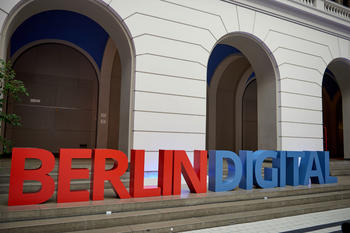Digitalization: 50 New Professorships for Berlin
The professorships are part of the new Einstein Centre Digital Future.
Sep 26, 2016
Berlin will be getting 50 new professors in the field of digitalization. They will be selected from the four Berlin universities: Technische Universität Berlin, Universität der Künste Berlin as well as Freie Universität Berlin and Humboldt-Universität zu Berlin, with their joint medical faculty, Charité – Universitätsmedizin Berlin. The professorships are part of the new Einstein Center Digital Future, which was approved by the Einstein Foundation Berlin on 5 September, 2016. A total of 38.5 million euros will flow into the new Einstein Center.
This unique project has been made possible by numerous partners in business, the sciences and politics. In addition to the four Berlin universities and the two universities of applied sciences, eight non-university research institutionsare also involved, as well as 20 companies. The German Federal Ministry of Labor and Social Affairs and the Federal Ministry of Education and Research are also involved. The state of Berlin is also strongly committed to the initiative.
The magnitude of this alliance between twelve public institutions as well as foundations and supporters is unique for Berlin, which is already known as a location for the sciences.
The researchers at the Einstein Center Digital Future will conduct research in four areas:
- The core area of digital infrastructure, methods and algorithms,
and the three innovation areas of
- digital industry and services,
- digital society and humanities as well as
- digital health.
The professorships are deliberately conceived of as interdisciplinary and are supposed to offer interfaces with other disciplines in their research. The Einstein Center Digital Future would like to become a cross-university nucleus for supporting and researching digital structures in the sciences, the economy and society. The project in Berlin is supposed to provide more connections, new forms of cooperation, concentration on innovative cutting-edge interdisciplinary research and excellently trained young scientific talent instead of focusing on new individual initiatives.
The Einstein Center’s designated spokespersons are:
- Einstein Center Digital Future: Professor Odej Kao, Technische Universität Berlin
- innovation area “digital health”: Professor Erwin Böttinger, Chair of the Berlin Institute of Health (BIH),
- innovation area “digital society and humanities“: Professor Gesche Joost, Universität der Künste Berlin,
- innovation area “digital industry and service”: Professor Jochen Schiller, Freie Universität Berlin
- core area “digital infrastructure, methods and algorithms”: Professor Johann-Christoph Freytag, Humboldt-Universität zu Berlin.
The Einstein Center Digital Future has a planned running period of six years. The first step is the call for the first 18 professorships on 12 September 2016. A second call will also take place this year.
The individual topics for the professorships are quite varied. For example, research is supposed to be done in the areas of smart housing, smart cities, smart mobility, digital education, bioinformatics, personalized medicine, digital diagnostics or new methods in genome data analysis and biomedical imaging as well as semantic data intelligence, identity management, physical foundations of IT security, the Internet of Things and wearable technologies. The topics of water and sewage systems 4.0, digitalization and the workplace as well as digitalization and multicultural aspects also play a role.
The space at Willhelmstrasse directly near the Robert Koch Forum is also supposed to create an interdisciplinary research environment in which the best young “digital minds” from all over the world develop, shape and advance digitalization in the sciences, the economy and society together with excellent researchers from Berlin universities and non-university research institutions as well as partners from industry and society. Many of the new professorships will be located at this new address for the Einstein Center. The new location will provide the initiative with a visible center in the heart of the German capital. It is also supposed to develop into a public forum for the exchange of important and current ideas around digitalization.
This text was originally published in German on September 12, 2016 as a joint press release by Charité – Universitätsmedizin Berlin, Freie Universität Berlin, Humboldt-Universität zu Berlin, Technische Universität Berlin, Universität der Künste Berlin.
Further Information
Further information about the Einstein Center Digital Future and the call for the professorships can be found at www.be-digital.berlin. The website is updated continuously.

